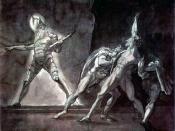William Shakespeare, perhaps the greatest playwright of all time, authored a number of works consisting of sonnets, comedies, and tragedies. In his brilliant career, Shakespeare created literary works of art.
What makes Shakespeare unlike any other writer of his time, is his ability to organize a realistic plot, manage themes, and develop characters within his works (Nordling). As well, Shakespeare's ability to provoke feeling and reaction to his writing is also what sets him apart from other common writers. Of his works, Hamlet is perhaps the most studied and most interesting of the collected tragedies. In this play, many question the actions of the characters and particularly the actions of Hamlet. The answer to: 'Why does Hamlet delay in avenging the death of his father?' is one that is not easy to identify. Possible conclusions include the role of others in Hamlet, Hamlet's religious nature, or even Hamlet's tragic flaw as a hero in Hamlet.
It is often argued that Hamlet was written as a tragedy of the human spirit (Nighan). Others argue that it is a tragedy of destiny, or the hero. In every hero's quest for the truth, none is more apparent than that of Hamlet. This search for truth is born of
the passing of young Hamlet's father. It is at the critical moment of revelation by the Ghost of Hamlet that young Hamlet is destined for revenge.
Although the concept of revenge may be considered an evil justice, it is evident that the importance lay within the context of carrying out the fate. The question arises of 'Why did Hamlet not take revenge sooner upon Claudius?' The how and when of this vengeance becomes critical in the development of Hamlet the character. To fully comprehend the true essence of Hamlet as a son, a discoverer, and...


